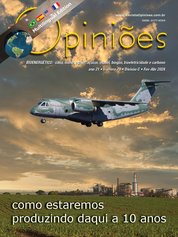Carlos Daniel Berro Filho
Diretor de Desenvolvimento Agronômico da Raízen
OpAA79
O futuro verde
Nos últimos anos, testemunhamos uma evolução notável na indústria bioenergética, impulsionada por avanços tecnológicos e uma crescente conscientização sobre a importância da sustentabilidade ambiental. Em um futuro próximo, como será a produção do sistema bioenergético? Quero aqui explorar as principais tendências e inovações que moldarão o futuro dessa agroindústria.
Uma das mudanças mais significativas é a ascensão da agricultura regenerativa. Este modelo agrícola inovador prioriza a saúde do solo, a diversidade biológica e a resiliência dos ecossistemas. A crescente adoção de biológicos será fundamental, permitindo que os agricultores reduzam sua dependência de fertilizantes químicos e defensivos que podem ser prejudiciais.
No entanto, um estudo recente do CEBDS - Conselho Empresarial Brasileiro para o Desenvolvimento Sustentável, destaca a falta de métricas e de definições abrangentes para a agricultura regenerativa no Brasil, dificultando sua promoção. A publicação sugere a criação de definições que considerem a diversidade de práticas agrícolas sustentáveis e conservacionistas, adaptadas à realidade nacional.
No entanto, um estudo recente do CEBDS - Conselho Empresarial Brasileiro para o Desenvolvimento Sustentável, destaca a falta de métricas e de definições abrangentes para a agricultura regenerativa no Brasil, dificultando sua promoção. A publicação sugere a criação de definições que considerem a diversidade de práticas agrícolas sustentáveis e conservacionistas, adaptadas à realidade nacional.
Conforme indicado no estudo, a promoção da agricultura regenerativa no Brasil pode ser impulsionada por uma variedade de meios, tanto pelo setor público quanto pelo privado. Foram identificadas potenciais ferramentas para estimular a produção agrícola regenerativa, como as pesquisas em práticas agrícolas, o incentivo a tecnologias voltadas à agricultura de baixo carbono, a criação de instrumentos de comunicação com produtores rurais para capacitação em técnicas mais sustentáveis e produtivas, o uso de instrumentos financeiros, como o crédito rural subsidiado, as políticas de preços e as políticas de comando e de controle.
Além da agricultura regenerativa, a economia circular emergirá como um princípio orientador na produção bioenergética. Os próprios resíduos da produção de biomassa serão reaproveitados como fonte de nutrição para o solo, fechando o ciclo de nutrientes e reduzindo a dependência de fertilizantes externos.
Essa abordagem não apenas promove a sustentabilidade ambiental, mas também pode gerar economias significativas para os agricultores, reduzindo os custos de insumos.
A automação e a tecnologia desempenharão papéis cada vez mais cruciais na produção bioenergética. Sistemas de inteligência artificial (IA) e computação em nuvem serão ferramentas essenciais, permitindo a análise de grandes conjuntos de dados e a otimização do manejo do canavial. Essa abordagem oferece aos agricultores a capacidade de tomar decisões mais informadas e precisas, resultando em operações mais eficientes e sustentáveis. Além disso, a manutenção da utilização de drones e imagens de satélite continuará possibilitando uma monitorização detalhada das plantações, permitindo a identificação de áreas de estresse e de intervenções precisas.
No contexto específico da Raízen, diversas inovações tecnológicas são implementadas para maximizar a eficiência. A parceria com a startup brasileira Space Time Analytics permite prever, com até um ano de antecedência, a capacidade de produção da safra de cana em todas as unidades da empresa. Além disso, a companhia foi pioneira na utilização de VANTs no setor, utilizando esses equipamentos para mapeamento topográfico detalhado e para identificação de falhas na brotação do canavial. Essas iniciativas resultam em uma ampliação significativa da capacidade de monitoramento do canavial, proporcionando uma melhor antecipação de problemas.
A mecanização continua sendo um importante tema, evoluindo em tecnologias, sensores, rendimentos, automação e reduzindo assim o impacto ambiental pelo ganho de suas eficiências dos processos agrícolas. Na Raízen, os processos são mecanizados do plantio à colheita, e a operação é integrada através da Central de Inteligência Agrícola, que acompanha em tempo real toda a logística.
O uso de tecnologia de controle de tráfego permite que a colhedora seja guiada automaticamente na linha da cultura, evitando perdas e aumentando a qualidade da matéria-prima. No plantio, o piloto automático integrado com os VANTs permite o melhor traçado para a mecanização e a conservação do solo. A empresa implementou técnicas de agricultura de precisão, como a instalação de GPS e controles de vazão nos implementos agrícolas. Isso possibilita o controle e a automação na aplicação de fertilizantes e defensivos durante a operação, contribuindo para uma gestão mais eficiente dos recursos e uma produção mais sustentável.
Para acompanhar essas mudanças, o perfil do profissional agrícola também evoluirá. Os agricultores do futuro serão diversos em suas habilidades, com afinidade para o uso de ferramentas tecnológicas avançadas. Eles entenderão a importância da agricultura regenerativa e serão capazes de aplicar práticas sustentáveis em seus campos. Habilidades como análise de dados e gestão de sistemas automatizados serão essenciais para o sucesso na indústria bioenergética do futuro.
Por fim, a diversidade de variedades cultivadas será fundamental para a adaptação às mudanças climáticas e à maximização da produção de biomassa. Variedades que respondem bem a sistemas irrigados serão especialmente valorizadas, pois a irrigação se tornará um agente importante na produção bioenergética. A mecanização também desempenhará um papel crucial, aumentando a eficiência e reduzindo os custos de produção.
Em suma, o futuro da produção bioenergética será marcado pela inovação tecnológica, sustentabilidade ambiental e uma abordagem holística para a agricultura. Com a combinação certa de práticas agrícolas regenerativas, como a economia circular e a tecnologia de ponta, podemos construir um sistema bioenergético resiliente e eficaz, capaz de enfrentar os desafios do século XXI.




